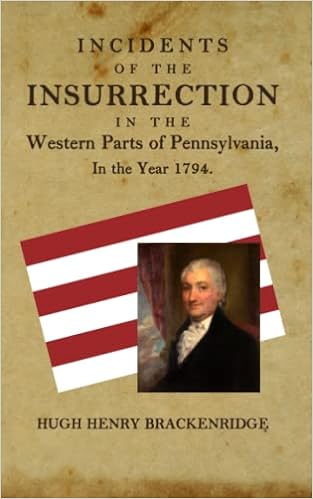The Whiskey Rebellion was a feckless, doomed-from-the-start insurrection pushed mostly by people who were in the habit of insurrecting and didn’t know how to stop. The Treaty of Paris ending the Revolution was only eleven years old, and many of the men who had settled in the west country of Pennsylvania had fought in that war. Now the wicked Easterners, who were scarcely better than British, were imposing an excise tax on whiskey, the staple product that made farming profitable in the West. No taxation without representation! Well, we had representation, but… Liberty and no excise! It was time for another revolution!
And then President Washington sent an army and, well, you know… We weren’t really serious about rebelling…
The “flag with six stripes” is often spoken of as raised by the rebels—the six stripes representing the six counties of the West. They had other flags as well; the elaborate one preserved at the Century Inn is the model for all the “Whiskey Rebellion” flags sold by historical souvenir specialists. But the six-striped flag seems to have been the most common. Old Pa Pitt does not know of any surviving examples, so his reconstruction above is speculative. Other speculative reconstructions add a canton with six stars, but that would turn a hastily improvised banner into a craft project. Since only the stripes are mentioned in our sources, Father Pitt suspects only the stripes were used. The reconstructed flag is an SVG file that can be used at any size without loss of resolution (not that there’s much to resolve), and—like all of Father Pitt’s illustrations—it is released into the public domain with a CC0 Universal Public Domain Dedication.
The story of the Whiskey Rebellion is best told by Hugh Henry Brackenridge, who was caught up in the middle of it and did his best to avert a civil war while also keeping himself alive—the latter of which was at least as difficult as the former. Brackenridge was Pittsburgh’s and the nation’s greatest literary figure in President Washington’s time, and he tells the story with the narrative skill of a practiced novelist and the humor of a famous wit.

This new carefully printed edition of Incidents of the Insurrection is the first in a series of important Pittsburgh books issued by the Franklin Head, a joint venture between Father Pitt and his old friend Dr. Boli.
Independence Day is a good day to reflect on the blessings we enjoy because of the surprising collective wisdom of the rabble we call our Founding Fathers. They bought us independence from Britain by a successful rebellion, but they also understood that perpetual rebellion is hell on earth. When we remember Washington and the rest today, we should remember that independence was one of their gifts, but orderly representative government was an even greater gift, and one they were just as willing to fight for.

